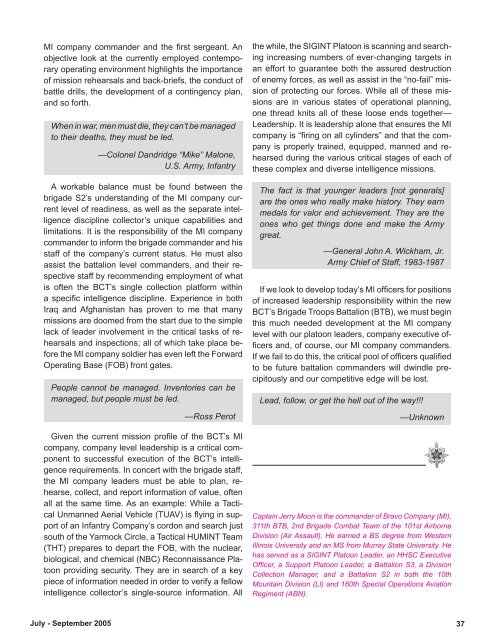Military Intelligence Professional Bulletin - Federation of American ...
Military Intelligence Professional Bulletin - Federation of American ...
Military Intelligence Professional Bulletin - Federation of American ...
You also want an ePaper? Increase the reach of your titles
YUMPU automatically turns print PDFs into web optimized ePapers that Google loves.
MI company commander and the first sergeant. An<br />
objective look at the currently employed contemporary<br />
operating environment highlights the importance<br />
<strong>of</strong> mission rehearsals and back-briefs, the conduct <strong>of</strong><br />
battle drills, the development <strong>of</strong> a contingency plan,<br />
and so forth.<br />
When in war, men must die, they can’t be managed<br />
to their deaths, they must be led.<br />
—Colonel Dandridge “Mike” Malone,<br />
U.S. Army, Infantry<br />
A workable balance must be found between the<br />
brigade S2’s understanding <strong>of</strong> the MI company current<br />
level <strong>of</strong> readiness, as well as the separate intelligence<br />
discipline collector’s unique capabilities and<br />
limitations. It is the responsibility <strong>of</strong> the MI company<br />
commander to inform the brigade commander and his<br />
staff <strong>of</strong> the company’s current status. He must also<br />
assist the battalion level commanders, and their respective<br />
staff by recommending employment <strong>of</strong> what<br />
is <strong>of</strong>ten the BCT’s single collection platform within<br />
a specific intelligence discipline. Experience in both<br />
Iraq and Afghanistan has proven to me that many<br />
missions are doomed from the start due to the simple<br />
lack <strong>of</strong> leader involvement in the critical tasks <strong>of</strong> rehearsals<br />
and inspections; all <strong>of</strong> which take place before<br />
the MI company soldier has even left the Forward<br />
Operating Base (FOB) front gates.<br />
People cannot be managed. Inventories can be<br />
managed, but people must be led.<br />
—Ross Perot<br />
Given the current mission pr<strong>of</strong>ile <strong>of</strong> the BCT’s MI<br />
company, company level leadership is a critical component<br />
to successful execution <strong>of</strong> the BCT’s intelligence<br />
requirements. In concert with the brigade staff,<br />
the MI company leaders must be able to plan, rehearse,<br />
collect, and report information <strong>of</strong> value, <strong>of</strong>ten<br />
all at the same time. As an example: While a Tactical<br />
Unmanned Aerial Vehicle (TUAV) is flying in support<br />
<strong>of</strong> an Infantry Company’s cordon and search just<br />
south <strong>of</strong> the Yarmock Circle, a Tactical HUMINT Team<br />
(THT) prepares to depart the FOB, with the nuclear,<br />
biological, and chemical (NBC) Reconnaissance Platoon<br />
providing security. They are in search <strong>of</strong> a key<br />
piece <strong>of</strong> information needed in order to verify a fellow<br />
intelligence collector’s single-source information. All<br />
the while, the SIGINT Platoon is scanning and searching<br />
increasing numbers <strong>of</strong> ever-changing targets in<br />
an effort to guarantee both the assured destruction<br />
<strong>of</strong> enemy forces, as well as assist in the “no-fail” mission<br />
<strong>of</strong> protecting our forces. While all <strong>of</strong> these missions<br />
are in various states <strong>of</strong> operational planning,<br />
one thread knits all <strong>of</strong> these loose ends together—<br />
Leadership. It is leadership alone that ensures the MI<br />
company is “firing on all cylinders” and that the company<br />
is properly trained, equipped, manned and rehearsed<br />
during the various critical stages <strong>of</strong> each <strong>of</strong><br />
these complex and diverse intelligence missions.<br />
The fact is that younger leaders [not generals]<br />
are the ones who really make history. They earn<br />
medals for valor and achievement. They are the<br />
ones who get things done and make the Army<br />
great.<br />
—General John A. Wickham, Jr.<br />
Army Chief <strong>of</strong> Staff, 1983-1987<br />
If we look to develop today’s MI <strong>of</strong>ficers for positions<br />
<strong>of</strong> increased leadership responsibility within the new<br />
BCT’s Brigade Troops Battalion (BTB), we must begin<br />
this much needed development at the MI company<br />
level with our platoon leaders, company executive <strong>of</strong>ficers<br />
and, <strong>of</strong> course, our MI company commanders.<br />
If we fail to do this, the critical pool <strong>of</strong> <strong>of</strong>ficers qualified<br />
to be future battalion commanders will dwindle precipitously<br />
and our competitive edge will be lost.<br />
Lead, follow, or get the hell out <strong>of</strong> the way!!!<br />
—Unknown<br />
Captain Jerry Moon is the commander <strong>of</strong> Bravo Company (MI),<br />
311th BTB, 2nd Brigade Combat Team <strong>of</strong> the 101st Airborne<br />
Division (Air Assault). He earned a BS degree from Western<br />
Illinois University and an MS from Murray State University. He<br />
has served as a SIGINT Platoon Leader, an HHSC Executive<br />
Officer, a Support Platoon Leader, a Battalion S3, a Division<br />
Collection Manager, and a Battalion S2 in both the 10th<br />
Mountain Division (LI) and 160th Special Operations Aviation<br />
Regiment (ABN).<br />
July - September 2005 37
















